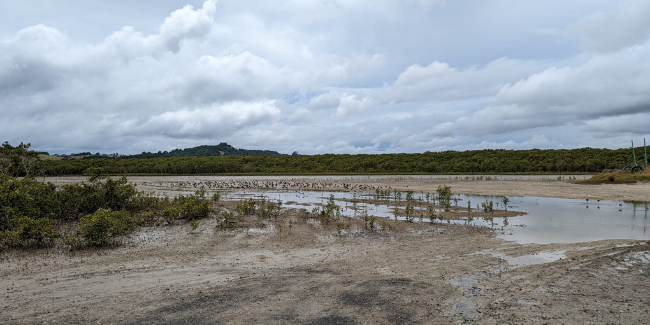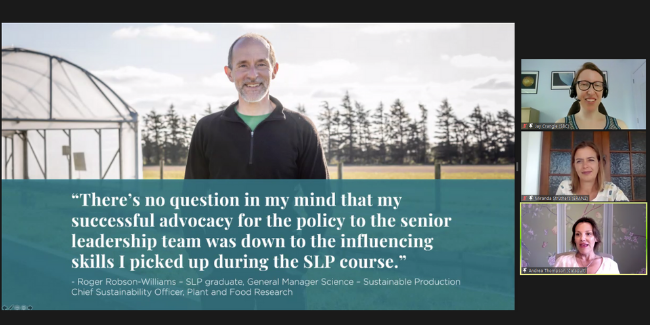5 Sustainability trends to watch in 2022
Our Leadership Manager Jay Crangle delves into some of the top emerging sustainability trends to keep your eye on in 2022.
Don’t forget you can grow your skills and confidence to tackle sustainability challenges by signing up to the 2022 Catapult/SBC Sustainability Leadership Programme.
If there was a Wordle based on acronyms, Aotearoa would be in the running for top score. With our long list of sustainability regulation and reforms this year – ERP, RMA, ETS, NBA, CAA, OMG – there are no shortage of developments in the sustainability space to keep abreast of in 2022.
Here are some of the emerging trends to keep on your radar – with thanks to SBC members for peering into their crystal balls to assist!
1. Your impact on the climate/the climate’s impact on you
As we experience more extreme weather events (and my hair doubles in size from the Auckland humidity) the impacts of climate change are already being felt. The growth of these impacts risks what the WEF calls a ‘disorderly climate transition’, yet some view focusing on adapting to these impacts as ‘giving up’. But we need instead to reframe mitigation (reducing the severity of our impact on the climate) and adaptation (adapting to the climate’s impact on us) as two sides of the same coin. IAG’s work in this area, including their climate sentiment survey, provide some fascinating insights into this area – as will SBC’s work with Kantar on the Better Futures report, due out in March.
The Government’s National Adaptation Plan is due by 3 August , and SBC will be working across its members to engage in the process. Raising business capability and the profile of adaptation considerations, particularly as they relate to our businesses, is also a goal for the CLC/SBC Adaptation Working Group this year.
2. Restoring nature
As I smile at the tūī arguing over our canna lilies, I am reminded of the interconnection of our natural environment with our wellbeing. Our laser focus on carbon reduction needs to be broadened to a holistic view of protecting our ecological systems. Over 50% of the world’s GDP is dependent on nature and it is in crisis, with over 4,000 indigenous species at risk of extinction in Aotearoa alone. Ensuring nature is able to thrive in turn protects us from climate change impact.
Reframing our focus on emission reduction as a wider commitment to thriving ecosystems is crucial to ensuring we start living within our planetary boundaries. As one example part of Auckland Council’s Climate Plan, includes a framework to Integrate nature-based solutions in development planning.

3. Creating people-centric workplaces
COVID has had a significant impact on the labour market. Demand for talent is escalating – data from Trade Me jobs showed a record 69,600 job vacancies in the December quarter (matched only by the number of unwanted Christmas presents). The pandemic has also prompted many to re-examine their relationship with work. More of us are seeking employment that better aligns with our values.
Creating a people-first workplace with purpose is now essential. There are many different ways of thinking about this. SkyCity, for example, has approached this through the lens of inclusivity, and developed an award winning project providing pathways to employment for vulnerable Māori and Pasifika community members.
It will be interesting to see the impact on the sustainability profession in our annual Sustainability Professionals Survey, with those insights due out in May.
4. Regenerative finance
Global capital is slowly shifting towards sustainability priorities. Over $130t of pledges were made at COP26. In Aotearoa the work of our partners at Tōitu Tahua and Mindful Money represent a shift in thinking of the finance sector towards social and environmental impact – echoed in the findings of our CFO snapshot last year.
The evolution of this is regenerative finance – moving our economy from being extractive to being regenerative. This means ensuring profits serve a purpose, money is used as a tool, not an end goal and stakeholders, not just shareholders, are involved in decision making. NZ Post, for instance, have established a decarbonisation fund using money they would have put towards offsetting. And Westpac are undertaking some excellent mahi to ensure capital flows to the parts of the economy where it is needed to facilitate the transition to net zero.
5. Levelling up your sustainability skills
This year promises to be another year of ever evolving sustainability priorities. The need to continue to grow and develop the sustainability profession has never been greater.
Our Sustainability Leadership Programme is an excellent way to grow your skills and confidence to tackle these challenges – don’t forget the early bird rate closes on 25 Feb. And for CFOs in particular, the next intake of our popular CFO and Climate Risk training starts in March.

